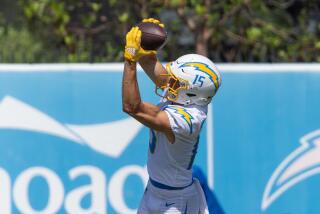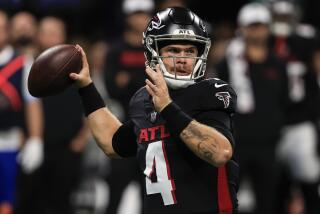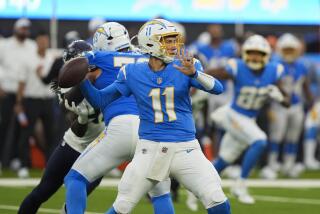Bernstine Will Fit In, Joiner Says : Tight End Is Glad to Be a Charger, and the Feelingâs Mutual
Rod Bernstine, the Chargersâ first-round draft pick from Texas A&M;, will have to compete at the teamâs deepest position, tight end. But Bernstine doesnât believe that will be a problem.
âI couldnât have asked for a better place to come,â he said. âSan Diego is ideal for a tight end.â
After weighing other options, specifically a running back, the Chargers decided they had to select Bernstine, whom they rated as being by far the best available player, regardless of the presence of three tight ends on the roster.
Along with Kellen Winslow, the Chargers plan to use Bernstine in two-tight-end formations. They will also employ Bernstine, a former college tailback, as a runner several times a game.
He also affords the luxury of depth at a spot that includes veterans Eric Sievers and Pete Holohan, both of whom have had injury problems the last few years. Winslow finally returned to top form last season, nearly two years after a devastating knee injury.
Bernstine caught 65 passes as a senior at Texas A&M; and has visions of catching 80 as a Charger.
He was a high school running back who learned to catch after he broke his leg as a junior. While Bernstine recuperating, the teamâs quarterback threw to Bernstine, who developed soft hands playing catch every day for months.
He went to college as a running back, but was told by Coach Jackie Sherrill in the spring of his sophomore year that he would have to change to tight end if he entertained hopes of a pro career.
âIt was hard at first,â he said. âThe linebackers gave me a beating. I was pretty easy to throw around until I got mentally adjusted to blocking. Now it gives me a thrill when they run a sweep my direction and I pin the guy Iâm supposed to block.â
Bernstine was introduced to his future position coach--Charlie Joiner--last summer during informal workouts in Houston.
For the past 10 years, Joiner prepared himself for training camp by running up a steep hill near his home in Houston. Other players got word of his training method, which helps build strong legs and feet as well as cardiovascular fitness.
Bernstine tried Joinerâs hill last June--and for a few days was defeated by it.
âMaybe I was dogging it at first,â Bernstine said. âCharlie kept pushing me and encouraging me.â
Joiner, who retired after the 1986 season and became the receiver coach, was impressed with Bernstineâs efforts.
âThereâs a lot of continuous movement for about 15 minutes,â Joiner said. âYou alternate running uphill in short quick steps and then backpedaling uphill. You have to do it without stopping, and it really develops your legs.
âI guided Rod through a lot of things as a receiver and developed a real good relationship with him. He looks studious and intelligent, and his athletic ability just pops out at you in every film. Heâs going to fit in real well here.â
The addition of Bernstine will enable the Chargers to weigh the possibility of using one of their four tight ends as part of a trade to secure a running back or inside linebacker before training camp.
If no trade comes about, the Chargers hope one of their three current runners, Tim Spencer, Buford McGee and Curtis Adams, will emerge as a more potent every-down back.
What were the Chargersâ options if they did not select Bernstine?
In the absence of a desirable defensive player, they probably would have taken Oregon quarterback Chris Miller with their first-round pick, according to Saunders.
But Miller was long gone before the Chargers were able to exercise the first-round pick they acquired from Cleveland in the Chip Banks deal. Atlanta took Miller with the 13th pick in the draft, and 11 picks later, the Chargers took Bernstine.
In ensuing rounds, the Chargers went for help in areas of obvious need--pass rush and pass defense, overall team speed, plus a young quarterback. Among the drafted players were defensive backs Lou Brock Jr. of USC and Nelson Jones of North Carolina State, defensive lineman Karl Wilson of LSU, and quarterback Mark Vlasic of Iowa.
âWe satisfied some very pressing needs,â Saunders said. âWe didnât get Cornelius Bennett (the Alabama linebacker drafted by Indianapolis and coveted by San Diego), but in Chip Banks, we got the maybe the best person in college or pro football for our needs.â
There was plenty of day-after talk about Tuesdayâs trade and draft choices, but Banks wasnât providing any.
The linebacker still wasnât talking to San Diego media a day after the Chargers acquired him and two draft picks from the Cleveland Browns for their first- and second-round draft choices.
But Charger coaches, who have talked with him, donât believe thereâs a problem.
âHopefully, there will be renewed enthusiasm on Chipâs part after coming to a new team,â Ron Lynn, the Chargersâ defensive coordinator, said Wednesday. âHe was still in a state of shock after I talked to him, but he also seemed excited. I have no indication that he has ever been a problem from a coaching standpoint. His contract hassle, as I see it, is strictly a front-office thing.â
Banks skipped two mini-camps with Cleveland and reported late last year after a contract holdout, but Saunders said he anticipates no attitude problems.
âHe starts with a clean slate here,â Saunders said. âAfter talking with Chip, he seems very optimistic about his future here.â


